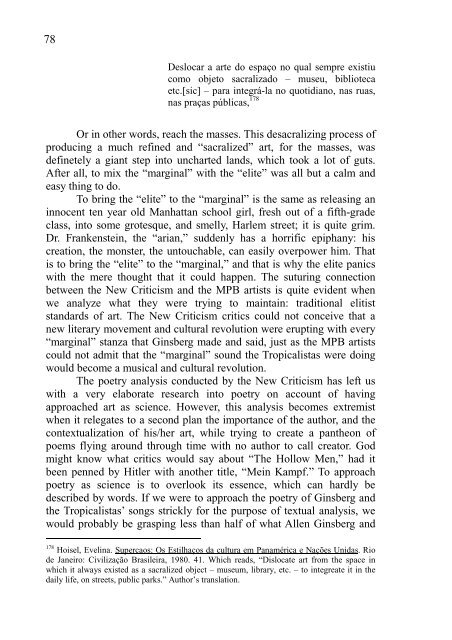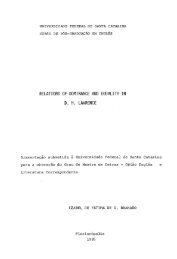Tropical ginsberg
Tropical ginsberg
Tropical ginsberg
You also want an ePaper? Increase the reach of your titles
YUMPU automatically turns print PDFs into web optimized ePapers that Google loves.
78<br />
Deslocar a arte do espaço no qual sempre existiu<br />
como objeto sacralizado – museu, biblioteca<br />
etc.[sic] – para integrá-la no quotidiano, nas ruas,<br />
nas praças públicas, 178<br />
Or in other words, reach the masses. This desacralizing process of<br />
producing a much refined and “sacralized” art, for the masses, was<br />
definetely a giant step into uncharted lands, which took a lot of guts.<br />
After all, to mix the “marginal” with the “elite” was all but a calm and<br />
easy thing to do.<br />
To bring the “elite” to the “marginal” is the same as releasing an<br />
innocent ten year old Manhattan school girl, fresh out of a fifth-grade<br />
class, into some grotesque, and smelly, Harlem street; it is quite grim.<br />
Dr. Frankenstein, the “arian,” suddenly has a horrific epiphany: his<br />
creation, the monster, the untouchable, can easily overpower him. That<br />
is to bring the “elite” to the “marginal,” and that is why the elite panics<br />
with the mere thought that it could happen. The suturing connection<br />
between the New Criticism and the MPB artists is quite evident when<br />
we analyze what they were trying to maintain: traditional elitist<br />
standards of art. The New Criticism critics could not conceive that a<br />
new literary movement and cultural revolution were erupting with every<br />
“marginal” stanza that Ginsberg made and said, just as the MPB artists<br />
could not admit that the “marginal” sound the <strong>Tropical</strong>istas were doing<br />
would become a musical and cultural revolution.<br />
The poetry analysis conducted by the New Criticism has left us<br />
with a very elaborate research into poetry on account of having<br />
approached art as science. However, this analysis becomes extremist<br />
when it relegates to a second plan the importance of the author, and the<br />
contextualization of his/her art, while trying to create a pantheon of<br />
poems flying around through time with no author to call creator. God<br />
might know what critics would say about “The Hollow Men,” had it<br />
been penned by Hitler with another title, “Mein Kampf.” To approach<br />
poetry as science is to overlook its essence, which can hardly be<br />
described by words. If we were to approach the poetry of Ginsberg and<br />
the <strong>Tropical</strong>istas’ songs strickly for the purpose of textual analysis, we<br />
would probably be grasping less than half of what Allen Ginsberg and<br />
178 Hoisel, Evelina. Supercaos: Os Estilhaços da cultura em Panamérica e Nações Unidas. Rio<br />
de Janeiro: Civilização Brasileira, 1980. 41. Which reads, “Dislocate art from the space in<br />
which it always existed as a sacralized object – museum, library, etc. – to integreate it in the<br />
daily life, on streets, public parks.” Author’s translation.

















